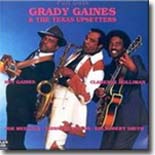|
Grady Gaines and
the Texas Upsetters
Full Gain
Black Top |

When I first discovered the blues in the mid ’80s,
the information age was still a ways down the road.
Al Gore had not even invented the internet yet. The
hardest thing for me, as a neophyte listener, miles
away from a blues club or festival, was finding out
who and what to listen to. In most record stores,
the blues section was pretty thin and there were not
a lot of sources of information out there focusing
on the genre, other than Living Blues, which
was hard to find, even in Mississippi where it was
published.
For me, there were several breakthroughs that really
helped me. First was the aforementioned Living
Blues, which I finally was able to subscribe to
(22 years and still going). Second, I became exposed
to live music via the New Orleans Jazz & Heritage
Festival, and a local blues festival was established
within 15 miles of my home that enabled me to see
some popular old and new blues acts. The third
breakthrough was a mail order company called Roundup
Records, which featured a ton of recordings from
different labels, different genres, and different
eras, plus some of the best, most informative
reviews of albums both old and new that I’d ever
read. I found out about Roundup from an ad in one of
the JazzFest programs that I picked up in N.O., and
each catalog I received from them was loaded with
info about these mysterious blues artists I was in
the process of discovering.
One of those labels I discovered via Roundup was
Black Top Records, where I discovered the music of
many wonderful, nearly forgotten blues and R&B stars
from 20 or 30 years earlier who were now returning
to the recording studio. Over the next few years, I
was fortunate enough to take in the music of artists
like Anson Funderburgh and Sam Myers, Hubert Sumlin,
Mighty Sam McClain, the great James “Thunderbird”
Davis, and, still one of my favorite guitarists of
all time, Clarence Holliman.
One of my favorite Black Top releases featured
Holliman and another guitar legend, Roy Gaines. They
both appeared on a fantastic album released in 1988
by Gaines’ brother, Grady Gaines and the Texas
Upsetters. The album, Full Gain, was set
up similar to those R&B revues of the ’50s, with
different musicians taking center stage behind the
same band. Most of the artists were from the Houston
area, veterans of the Duke/Peacock Records recording
days, but there were also a few musicians from New
Orleans, with impressive history behind them as
well.
Both Grady and Roy Gaines had cut their teeth as
session musicians for Duke/Peacock. Roy Gaines had
played guitar on many of Bobby “Blue” Bland’s early
recordings before moving to California to become a
highly sought-after session guitarist. Grady Gaines
had played saxophone for Bland, Clarence “Gatemouth”
Brown, and Johnny Ace before becoming a mainstay of
Little Richard’s band. That’s Gaines playing
saxophone on Little Richard’s piano in the movie,
“The Girl Can’t Help It.”
Full Gain also featured several other Houston
legends. Holliman had started with Charles Brown at
17 and played guitar on many Bland sessions. Teddy
Reynolds had played piano for Bland. Trumpet player
Floyd Arceneaux played for Ray Charles and Chuck
Willis, and singer Big Robert Smith was a mainstay
of the Houston music scene.
However, the real catch for the session was Joe
Medwick. Medwick had provided many songs for Bland
during the Duke glory years (“Farther Up The Road,”
“Cry Cry Cry,” “I Pity The Fool,” “Yield Not To
Temptation”) and even demo-ed most of the songs for
Bland. Duke/Peacock head man Don Robey bought these
songs from Medwick for a pittance, listed himself as
composer (using the name Deadric Malone), and cashed
in on the royalties himself. Medwick had been been
away from the blues scene in Houston for so long
that a lot of people presumed he was dead, so his
re-emergence was a major event.
As mentioned, several stars shined on this release.
Roy Gaines handled lead vocals on three songs (“Mr
Blues In The Sky,” “Stealing Love,” and the CD bonus
cut, “Gangster of the Blues”) and his razor-sharp
guitar is force to be reckoned with. Reynolds plays
piano and adds his Lightnin’ Hopkins-esque vocals to
two cuts, the laid-back “Shaggy Dog,” and “Miss Lucy
Brown.”
Medwick brought three songs to the session. There’s
no doubt that “If I Don’t Get Involved” would have
been a hit for Bobby “Blue” Bland back in the day
had he gotten the chance to record it (he actually
did record it for Malaco a few years after Full
Gain). Medwick himself turns in an outstanding
performance on the song. He also wrote and sang
“Your Girlfriend,” and his composition, “If I Loved
You A Little Less” is sung by Big Robert Smith.
Not to be outdone on his own album, Grady Gaines
turns in an exemplary performance, nearly blowing
the roof off the building with his saxophone on a
scorching set of instrumentals (“Full Gain,” King
Curtis’ “Soul Twist,” and the old New Orleans R&B
chestnut, “There Is Something On Your Mind”).
Hollimon provides plenty of tasteful, stinging leads
throughout, as he would continue to do for the
duration of Black Top’s existence.
Grady Gaines would release a follow-up a few years
later. Although Roy Gaines didn’t play on the second
release (Anson Funderburgh filled his spot), and Joe
Medwick passed away from liver cancer before the
project was undertaken, Horn of Plenty was a
strong release. We’ll be looking at it in a few
months.
Soon afterward, Black Top was gone as well, going
under in the late 1990s. In recent years, there have
been some efforts to reissue many of these
recordings by several labels. Hopefully, they will
get around to Full Gain sooner than later.
--- Graham Clarke